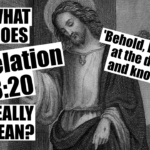To listen on YouTube, CLICK HERE.
WHAT DOES REVELATION 3:20 REALLY MEAN?
Pastor Mike here.
This is the second in a series under the heading, What Does This Bible Verse or What Does This Bible Passage Really Mean?
I want to talk to you about Revelation 3:20 today, “‘Behold, I stand at the door and knock. If anyone hears my voice and opens the door, I will come in to him and eat with him, and he with me.'”
Pastors often use this verse during altar calls for unbelievers to get saved and in this way.
They say, “Jesus is knocking at the door of your heart, will you let Him in? After all, He has a wonderful plan for your life and wants to bless you.”
And they go on from there.
Now this is just wrong on so many levels.
And especially since it’s a misuse of Revelation 3:20.
And it’s also a breaking of the second commandment:
“You shall not take the name of the Lord your God in vain.” (Exodus 20:7)
When you use a Bible verse or passage and you say it means something that it doesn’t mean you are sinning.
You are committing blasphemy.
It’s not something to be taken lightly.
And so why is this not the real meaning or a twisting of Revelation 3:20 in the way that pastors in my example sometimes use it?
Well, we need look no further than the context of the verse and the verses that surround it for an answer.
The three rules in real estate are: Location, location, location.
The three rules in Bible interpretation are: Context, context, context. (hat tip Pirate Christian)
THE CONTEXT OF REVELATION 3:14-22
And now just by simply reading Revelation chapter 3, v. 14-22, we’ll discover the context of the verse Revelation 3:20 in particular.
In Revelation 3, verse 14, it reads…
14 “And to the angel of the church in Laodicea write: ‘The words of the Amen, the faithful and true witness, the beginning of God’s creation.
15 “‘I know your works: you are neither cold nor hot. Would that you were either cold or hot!
16 So, because you are lukewarm, and neither hot nor cold, I will spit you out of my mouth.
17 For you say, I am rich, I have prospered, and I need nothing, not realizing that you are wretched, pitiable, poor, blind, and naked.
18 I counsel you to buy from me gold refined by fire, so that you may be rich, and white garments so that you may clothe yourself and the shame of your nakedness may not be seen, and salve to anoint your eyes, so that you may see.
19 Those whom I love, I reprove and discipline, so be zealous and repent.
And now here’s the verse we’re talking about today…
20 Behold, I stand at the door and knock. If anyone hears my voice and opens the door, I will come in to him and eat with him, and he with me.
21 The one who conquers, I will grant him to sit with me on my throne, as I also conquered and sat down with my Father on his throne.
22 He who has an ear, let him hear what the Spirit says to the churches.’”
And let’s just stop right there.
Again, we’re determining the context of Revelation 3:20 by reading the surrounding verses – Revelation 3:14-22 – and by doing so we’ll able to rightly understand what Revelation 3:20 means.
Now the context of these verses is a part of the greater context that includes Revelation chapter 2 and Revelation chapter 3.
In these chapters we find Christ is giving the Apostle John seven letters addressed to seven churches in Asia Minor in the 1st Century.
And the seventh of these letters to the church at Laodicea is where I stand at the door and knock is found.
And so, first of all, Revelation 3:20 can’t mean what pastors are using it for in altar calls since it is a letter to the church of Laodicea in the 1st Century.
And then now secondly, this seventh letter to the church at Laodicea is written to believers (the Laodicean church) and not to unbelievers.
And since an altar call is for unbelievers to get saved it can’t possibly mean that Jesus is knocking at the door of your heart, will you let Him in?
And then now thirdly, the expanded context shows us that the idea of Jesus not being able to open a door is absurd.
Revelation 3:7 reads…
“And to the angel of the church in Philadelphia write: ‘The words of the holy one, the true one, who has the key of David, who opens and no one will shut, who shuts and no one opens.’”
And so with these three things in mind – (1) I stand at the door and knock is part of a letter to a church in the 1st Century, (2) it’s written to believers and not unbelievers, and (3) the idea of Jesus not being able to open a door is absurd – what then is the real meaning of Revelation 3:20?
In simplest terms, Jesus is calling a church to repent who has forgotten Him.
Revelation 3:19…
19 Those whom I love, I reprove and discipline, so be zealous and repent.
And so v. 20, coupled with v. 19 in particular, is about a church repenting – a congregation of Christians – and not a call to unbelievers to get saved.
The church at Laodicea was neither cold nor hot.
They were lukewarm.
This was seen in that they were relying on themselves and their “spirituality,” their “works,” the things they were doing for God as evidence of their salvation, and not relying on the Christ who saves.
Revelation 3:17…
17 For you say, I am rich, I have prospered, and I need nothing, not realizing that you are wretched, pitiable, poor, blind, and naked.
And so this is the real meaning of Revelation 3:20.
APPLICATION FOR US WHO ARE BELIEVERS
And it has application for us who are believers as the seven letters of Revelation chapter 2 and Revelation chapter 3 are also written to the entirety of the church throughout the centuries.
And especially when, as a body of believers, we fall into the trap of self-righteousness, relying on our own good works as if God is somehow impressed, rather than on Christ’s work on the cross in our place and on our behalf.
There is probably no better place in Scripture where the trap of self-righteousness is captured along with its antidote than in Jesus’ parable of The Pharisee and Tax Collector.
In Luke 18:9-14, a Pharisee, obsessed by his own virtue, is contrasted with a tax collector who knows he is nothing without Christ.
And with it now I close…
9 He (Jesus) also told this parable to some who trusted in themselves that they were righteous, and treated others with contempt:
10 “Two men went up into the temple to pray, one a Pharisee and the other a tax collector.
11 The Pharisee, standing by himself, prayed thus: ‘God, I thank you that I am not like other men, extortioners, unjust, adulterers, or even like this tax collector.
12 I fast twice a week; I give tithes of all that I get.’
13 But the tax collector, standing far off, would not even lift up his eyes to heaven, but beat his breast, saying, ‘God, be merciful to me, a sinner!’
14 I tell you, this man went down to his house justified, rather than the other. For everyone who exalts himself will be humbled, but the one who humbles himself will be exalted.”




